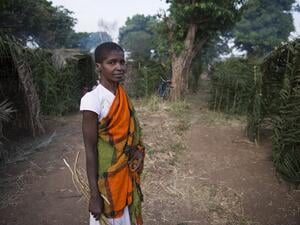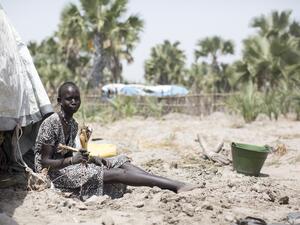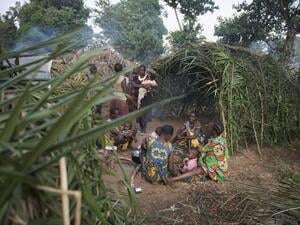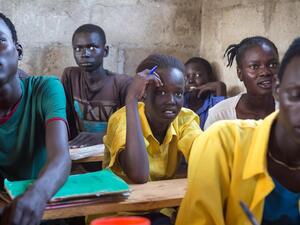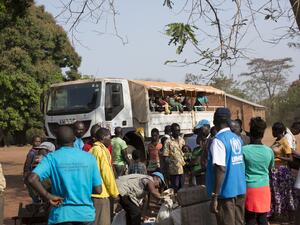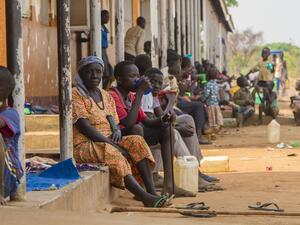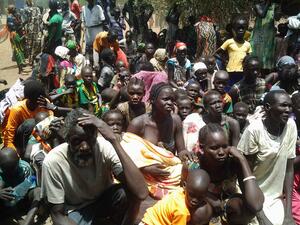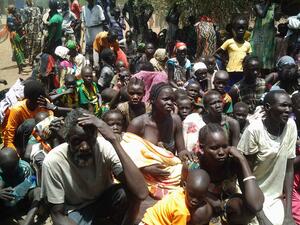Picking up the pieces: UNHCR helps victims of South Sudan camp clash
Picking up the pieces: UNHCR helps victims of South Sudan camp clash

Toma Ibrahim Kuku fled her home in the Yida refugee settlement in South Sudan earlier this month following an exchange of gunfire. She and her family have opted to live temporarily in another section of the camp.
YIDA CAMP, South Sudan, March 27 (UNHCR) - When armed clashes broke out in Yida refugee settlement earlier this month, Toma Ibrahim Kuku was terrified. With no time to grab anything as gunfire snapped around her, Toma fled into the bush with 11 members of her extended family, including her six children.
They spent the night in hiding. When gunshots echoed out again the following evening, Toma and her relatives fled once more, heading north towards the militarized and contested border with Sudan.
Days later, and with relative calm restored in Yida, UNHCR sent buses to the border zone to bring back Toma and some 1,000 other refugees who had fled the fighting. Lacking access to food and water, the group gratefully accepted.
But their relief was short-lived. "When we came back to Yida, we found everything had been taken," she explained. "We lost everything. Our blankets, jerry cans, soap. Our food. Everything was gone."
Over the past week or so, UNHCR has been working closely with refugees like Toma to assess how the community of more than 70,000 refugees in Yida has been affected by the violence and how assistance can best be provided. UNHCR staff have been conducting interviews with displaced families to determine their immediate needs before turning over replacement relief items to refugee leaders.
"As an expression of support to the refugees in Yida, we are providing relief items to refugee leaders to allow them to help their own people to rebuild their lives and communities," says Marie-Helene Verney, UNHCR's head of office in Unity state, where Yida is located. .
The shooting incident in Yida highlights the UN refugee agency's concerns about the presence of arms in the settlement, which compromises the civilian character of the area and greatly hinders UNHCR's ability to provide protection to refugees.
Toma's first night back in her empty shelter was spent wondering what to do next. Most of the shelters in her community had been abandoned as many refugees had fled abruptly to another part of the settlement.
In the morning, her brother arrived to take her and their family to an area where some 50 members of her tribe had sought refuge. Surrounded by belongings, sat the 46-year-old chief of the community, Ismail Kuku.
"I am responsible for seven families who fled with me when we saw bullets coming and going," Ismail explains. "I have found some space for my community in this new area. So that is where we are going to build new shelters to live with our children."
This Saturday UNHCR will open a new refugee camp in Unity state at Ajuong Thok. This will ease over-crowding in Yida. Some 20,000 refugees will begin moving there when the camp officially opens. The site is in a location that the government of South Sudan has designated as a safe and secure area for refugees to live.
For the past few weeks, UNHCR staff have been carrying out an information campaign to inform refugees of the rationale behind the opening of the camp as well and about the services that will be available. Refugees who have expressed an interest in moving to Ajuong Thok will benefit from access to primary and secondary education and livelihoods support that will be provided by UNHCR and humanitarian agencies working in the camp.
Toma and Ismail say they're relieved that Yida is relatively calm again. "Now that I have found my chief," says Toma, "we can start to rebuild our lives."
By Kathryn Mahoney in Yida Camp, South Sudan

